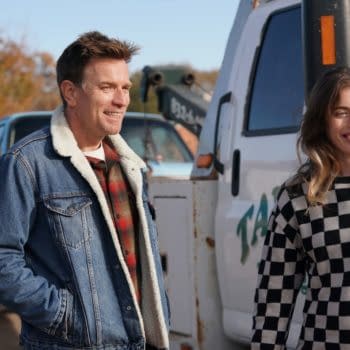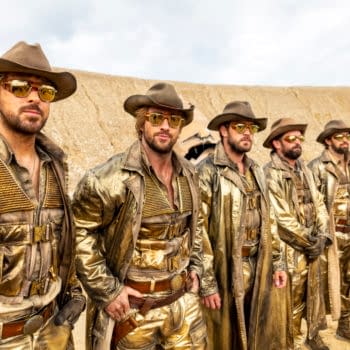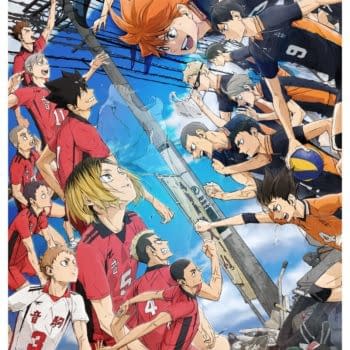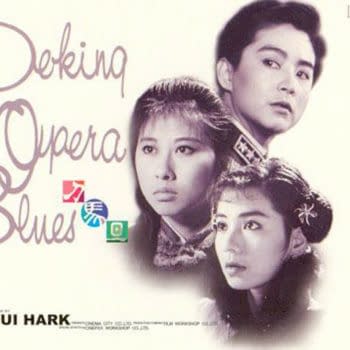Posted in: Movies, Recent Updates | Tagged: entertainment, film, indy filmmaking, production, Robin Hood Films, stephen spielberg, tom hanks
Film Schooling- Insider Insights On Indy Filmmaking: Be Flexible, Be Creative With Production
By Chris Hood
(This is Part Seventeen of an ongoing series to help educate aspiring filmmakers on the process of making their first film. Previous articles in this series can be found at BleedingCool.com and MovieIndustry.com)
Parts: 1, 2, 3, 4, 5, 6, 7, 8, 9, 10, 11, 12, 13, 14, 15, 16
In this article I want to address the importance and necessity of being flexible while in production. At first, this may seem to contradict the "be decisive" theme of the previous article, but there are time when the two attributes work hand in hand. The flexibility allows you to consider a broader range of options when complications arise and the decisiveness allows you to choose one quickly. Kind of like being a producing ninja…
The reason that flexibility needs to be embraced is the compromising nature of indy filmmaking. As a producer or director, you'll often know exactly what you want, but "wanting"and "getting" are often worlds apart. You'll experience this every step of the way, in virtually every department and decision. Casting, locations, FX, equipment, post and crew are all areas where flexibility will be required to bridge the gap between the vision and reality.
Let's be honest, we'd all like Tom Hanks to be in our film, but we have to flexible (okay, maybe "realistic" is a better example here), but even if you had a $50m budget, you may not be able to get him which requires? – that's right, flexibility. I was going to place this article as part of the pre-production process, but the reality is that it will apply to many, if not most, of the decisions you have to make. The less money and resources you have, the more flexible you have to be. As a producer, one of your mantras will become – "I know you want X but you'll have to settle with Y."
When it comes to actual production, flexibility will work closely with your need to be decisive because decisions will have to be made quickly and with a degree of pragmatism. A simple explanation of this would be if a scene requires a Lamborghini. Bad news – the Lambo we were supposed to get isn't coming. The immediate decision may be "Find me another Lambo!" Okay, great, but the one we had scheduled was a freebie owned by the dad of one of the producers. Are you asking me to "Find another FREE Lambo?" That's a different task. If you don't have the $1500 to rent one for the day, or know that that money can be better spent elsewhere, it's time to be flexible. If you're shooting in the desert 300 miles from a major city where an exotic car isn't even remotely a possibility, you need to be flexible. As yourself why that Lambo was in the scene in the first place. If it was to evidence the wealth of the owner, there are other ways to do that without fancy cars.
The greatest compliment to flexibility is creativity and the ability to think outside the box. Every film, regardless of the size, will have times when decisions have to be made quickly that can't possibly satisfy the original needs or wants of the production. A great mind will consider the obvious choices along with the unusual ones. When these situations arise, think outside the box.
If a location suddenly become unavailable, think big, think broad, think different. If a scene is set in a bar and suddenly the bar isn't available to you, the first thought is to "find another bar," but that's not what you should be thinking. You should be thinking, "Find another location." Rarely is a specific location essential to the scene or story. I remember having a great location in one of my films that we shot out the first week of production. I had to fire an actress early on and replace her, so two scenes had to be re-shot, including the one in that great location. Problem was, we couldn't get it any again. So we changed it around for the re-shoot. Instead of three ladies dressed fancy in a swank club, we shot them in bikinis on a beach (which was just outside a location we were already using) and the scene played great…probably better in fact because it was great production value and upped the skin value with trio of hotties kicking it on the sand. I could have beaten myself up trying to find another posh club, but was thinking with a more flexible mindset.
Sometimes, even actors aren't essential to scene. I had a scene I was shooting where the lead character was in an important meeting and had a friend with her for moral support and to help argue the case she was making. The friend in the scene wasn't available. The initial thought was – "We have to postpone this scene and shoot it later," but that wasn't practical as it was our last day at this location (which was essential) and we had very limited time with another actor in the scene. So, the two options were to make the lead handle the meeting on her own (which probably would have been okay) or find another work around. In this case, I scrambled and got another actress to the set. The replacement wasn't the "best" friend of the lead in the film, but was a friend we'd met earlier and ended up working just fine in the scene. I doubt it would have been any better with the original actress. Problem solved with the least amount of fuss. "Easy, peasy, Japanesy."
One of the best examples of all time is the movie Jaws. By now, most cinephiles have heard the story about what a nightmare that film was for Steven Spielberg. Only his second studio film after Sugarland Express (Duel doesn't count since it was made for TV), Jaws was a big step up for him, but was riddled with problems. Perhaps the biggest was the difficulty they had for MONTHS with the mechanical sharks that they couldn't get to function properly. Yet Spielberg powered on and did the best he could with what he had, being flexible and "shooting around" the shark. Looking back, he credits much of the success of the film on withholding images of the predator until later in the film. As he originally had planned it, the audience would have seen much more of the shark in the first two acts of the film, lessening the impact later in the film and removing much, if not most, of the anticipation. His flexibility and ultimate compromise paid off.
Now, I realize a lot of the decisions that we credit as the result of flexibility are done out of necessity, but new filmmakers have a habit of lumping flexibility in with compromise which most seem to look at as a bad thing. The irony is that there is probably no greater example of compromise than making a film on a small budget. Filmmakers will try to stay true to the vision in their head and often consider any kind of compromise as a failure or simply selling out. Every day on a film set, you'll be making compromises. The more flexible and creative you are, the more likely those compromises won't prove detrimental to the picture. We're probably splitting hairs with the semantics here, but let's be honest, "You have to be flexible," is easier to swallow than, "You have to compromise." The main difference is that compromise implies settling for less. Being flexible and creative, on the other hand, can effect change which isn't necessarily of a lesser degree.
Keep this in mind and when you look back on your film, you might just find that some of these moments dictated by necessity will pleasantly surprise you and, in some cases, even be high points in the film.
Chris Hood is a writer, producer and director of such films as "Counterpunch" starring Danny Trejo (a Lionsgate release) and "Dirty Dealing 3D" with Michael Madsen and C. Thomas Howell. He and Jon Schultz own Robin Hood Films, a Las Vegas-based distribution company representing English language films around the world and operates a film blog at MovieIndustry.com. He's also dead sexy. (Mr. Hood denies any involvement in the creation of this mini-bio.)

















